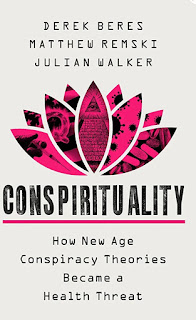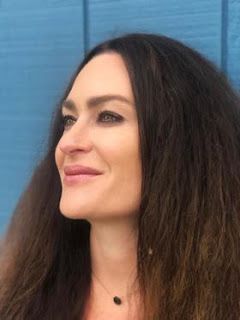James Ball
The Guardian
August 2, 2023
Jane – not her real name – is nervous about speaking to me. She has asked that I don’t identify her or the small, south-coast Devon town in which she lives. “I’m feeling disloyal, because I’m talking about people I’ve known for 30 to 40 years,” she says.
Jane isn’t trying to blow the whistle on government corruption or organised crime: she wants to tell me about her old meditation group. The group had met happily for decades, she says, aligned around a shared interest in topics including “environmental issues, spiritual issues and alternative health”. It included several people whom Jane considered close friends, and she thought they were all on the same page. Then Covid came.
Jane spent most of the first Covid lockdowns in London. During that time, she caught Covid and was hospitalised, and it was then that she realised something significant had changed: a friend from the group got in touch while she was on the ward. “I had somebody I considered a real best friend of mine on the phone telling me, no, I ‘didn’t have Covid’,” she says. “She was absolutely adamant. And I said: ‘Well, why do you think I went into hospital?’”
The friend conceded that Jane was ill, but insisted it must be something other than Covid-19, because Covid wasn’t real. Jane’s hospital stay was thankfully short, but by the time she was sufficiently recovered and restrictions had lifted enough to allow her to rejoin her meditation group, things were very different.
“They have been moving generally to far-right views, bordering on racism, and really pro-Russian views, with the Ukraine war,” she says. “It started very much with health, with ‘Covid doesn’t exist’, anti-lockdown, anti-masks, and it became anti-everything: the BBC lie, don’t listen to them; follow what you see on the internet.”
Things came to a head when one day, before a meditation session – an activity designed to relax the mind and spirit, pushing away all worldly concerns – the group played a conspiratorial video arguing that 15-minute cities and low-traffic zones were part of a global plot. Jane finally gave up.
This apparent radicalisation of a nice, middle-class, hippy-ish group feels as if it should be a one-off, but the reality is very different. The “wellness-to-woo pipeline” – or even “wellness-to-fascism pipeline” – has become a cause of concern to people who study conspiracy theories.
It doesn’t stop with a few videos shared among friends, either. One of the leaders of the German branch of the QAnon movement – a conspiracy founded on the belief that Donald Trump was doing battle with a cabal of Satanic paedophiles led by Hillary Clinton and George Soros, among others – was at first best known as the author of vegan cookbooks. In 2021, Attila Hildmann helped lead a protest that turned violent, with protesters storming the steps of Germany’s parliament. Such was his radicalism in QAnon and online far-right circles that he was under investigation in connection with multiple alleged offences, but he fled Germany for Turkey before he could be arrested.
Similarly, Jacob Chansley, AKA the “QAnon shaman” – one of the most visible faces of the attack on the US Capitol on 6 January 2021, thanks to his face paint and horned headgear – is a practitioner of “shamanic arts” who eats natural and organic food, and has more than once been described as an “ecofascist”.
Thanks to wellness, QAnon is the conspiracy that can draw in the mum who shops at Holland & Barrett and her Andrew Tate-watching teenage son. The QAnon conspiracy is one of the most dangerous in the world, directly linked to attempted insurrections in the US and Germany, and mass shootings in multiple countries – and wellness is helping to fuel it. Something about the strange mixture of mistrust of the mainstream, the intimate nature of the relationship between a therapist, spiritual adviser, or even personal trainer, and their client, combined with the conspiratorial world in which we now live, is giving rise to a new kind of radicalisation. How did we end up here?
There are many people interested in spiritualism, alternative medicine, meditation, or personal training, whose views fall well within the mainstream – and more who, if they have niche views, choose not to share them with their clients. But even a cursory online request about this issue led to me being deluged with responses. Despite most experiences being far less intense than Jane’s, no one wanted to put their name to their story – something about the closeness of wellness interactions makes people loth to commit a “betrayal”, it seems.
One person recounted how her pole-dancing instructor would – while up the pole, hanging on with her legs – explain how the CIA was covering up evidence of aliens, and offer tips on avoiding alien abduction.
“A physiotherapist would tell me, while working on my back with me lying face down, about her weekly ‘meetings’ in London about ‘current affairs’,” another said. “There was a whiff about it, but it was ignorable. Then, the last time I saw her, she muttered darkly about the Rothschilds [a common target of antisemitic conspiracy theories] ‘and people like that’. I didn’t go back.”
Some people’s problems escalated when their personal trainer learned about their work. “I had three successive personal trainers who were anti-vax. One Belgian, two Swiss,” I was told by a British man who has spent most of the past decade working in Europe for the World Economic Forum, which organises the annual summit at Davos for politicians and the world’s elite.
“It was hard because I used to argue with all of them and the Swiss made life very difficult for the unvaccinated, but the Swiss bloke insisted that, with the right mental attitude and exercise, you could defeat any illness. I was always asking what would happen if he got rabies.”
When the trainer found out the man worked for the World Economic Forum, he was immediately cut off.
Other respondents’ stories covered everything from yoga to reiki, weightlifters to alternative dog trainers. The theories they shared ranged from extreme versions of wellness-related conspiracies – about the risks of 5G and wifi, or Microsoft founder Bill Gates plotting with vaccines – to 15-minute cities, paedophile rings and bankers’ conspiracies.
Is there a reason why people under the wellness and fitness umbrella might be prone to being induced into conspiracy? It is not that difficult to imagine why young men hitting the gym might be susceptible to QAnon and its ilk. This group spends a lot of time online, there is a supposed crisis of masculinity manifesting in the “incel” (involuntary celibacy) movement and similar, and numerous rightwing influencers have been targeting this group. Add in a masculine gym culture and a community already keen to look for the “secrets” of getting healthy, and there is a lot for a conspiracy theory to hook itself on to.
What is more interesting, surely, is how women old enough to be these men’s mothers find themselves sucked in by the same rhetoric. These are often people with more life experience, who have completed their education and been working – often for decades – and have apparently functional adult lives. But, as Caroline Criado Perez, author of Invisible Women: Exposing Data Bias in a World Designed for Men, observes, the answer may lie in looking at why women turn to wellness and alternative medicine in the first place.
New age and conspiracy theories both see themselves as counter-knowledges challenging received wisdom
“Far too often, we blame women for turning to alternative medicine, painting them as credulous and even dangerous,” she says. “But the blame does not lie with the women – it lies with the gender data gap. Thanks to hundreds of years of treating the male body as the default in medicine, we simply do not know enough about how disease manifests in the female body.”
Women are overwhelmingly more likely than men to suffer from auto-immune disorders, chronic pain and chronic fatigue – and such patients often hit a point at which their doctors tell them there is nothing they can do. The conditions are under-researched and the treatments are often brutal. Is it any surprise that trust in conventional medicine and big pharma is shaken? And is it any surprise that people look for something to fill that void?
Criado Perez says: “If we want to address the trend of women seeking help outside mainstream medicine, it’s not the women we need to fix; it’s mainstream medicine.”
This sense of conspiracies filling a void is an important one. Academic researchers of conspiracy theories have speculated about whether their rise in the 20th century is related to the decline of religion. In a strange way, the idea that a malign cabal is running the world – while far more worrying than a benevolent God – is less scary than the idea that no one is in charge and everything is chaos. People who have a reason to mistrust the mainstream pillars of society – government, doctors, the media, teachers – are more likely to turn to conspiracy theories for explanations as to why the world is like it is.
Peter Knight, professor of American studies at the University of Manchester, who has studied conspiracy theories and their history, notes that the link between alternative therapies and conspiracy is at least a century old, and has been much ignored. “New age and conspiracy theories both see themselves as counter-knowledges that challenge what they see as received wisdom,” he says. “Conspiracy theories provide the missing link, turbo-charging an existing account of what’s happening by claiming that it is not just the result of chance or the unintended consequences of policy choices, but the result of a deliberate, secret plan, whether by big pharma, corrupt scientists, the military-industrial complex or big tech.”
Knight notes an extra factor, though – the wellness pipeline has become a co-dependency. Many far-right or conspiracy sites now fund themselves through supplements or fitness products, usually by hyping how the mainstream doesn’t want the audience to have them.
Alex Jones, the US conspiracist who for a decade claimed the Sandy Hook shootings – which killed 20 children and six adults – were a false-flag operation, had his financial records opened up when he was sued by the families of the victims. During the cases, it emerged he had made a huge amount of money by selling his own branded wellness products.
“Alex Jones perfected the grift of selling snake-oil supplements and prepper kit to the libertarian right wing via his conspiracy theory media channels,” Knight says. “But it was Covid that led to the most direct connections between far-right conspiracism and wellness cultures. The measures introduced to curb the pandemic were viewed as attacks on individual sovereignty, which is the core value of both the wellness and libertarian/‘alt-right’ conspiracy communities.”
The problem is, it rarely stops with libertarians. While they may not recognise it, those drawn in from the left are increasingly ending up in the same place as their rightwing counterparts.
“Although many of the traditional left-leaning alternative health and wellness advocates might reject some of the more racist forms of rightwing conspiracism, they now increasingly share the same online spaces and memes,” he says, before concluding: “They both start from the position that everything we are told is a lie, and the authorities can’t be trusted.”
Society’s discussion of QAnon, anti-vaxxers and other fringe conspiracies is heavily focused on what happens in digital spaces – perhaps too much so, to the exclusion of all else. The solution, though, is unlikely to be microphones in every gym and treatment room, monitoring what gets said to clients. The better question to ask is what has made these practitioners, and all too often their clients, so susceptible to these messages in the first place. For QAnon to be the most convincing answer, what someone has heard before must have been completely unsatisfactory.
Jane has her own theory as to why her wellness group got radicalised and she did not – and it’s one that aligns with concerns from conspiracy experts, too. “I think it’s the isolation,” she concludes, citing lockdown as the catalyst, before noting the irony that conspiracies then kick off a cycle of increasing isolation by forcing believers to reject the wider world. “It becomes very isolating because then their attitude is all: ‘Mainstream media … they lie about everything.’”
The Other Pandemic: How QAnon Contaminated the World by James Ball is published by Bloomsbury. To support the Guardian and Observer, order your copy at guardianbookshop.com. Delivery charges may apply
https://www.theguardian.com/lifeandstyle/2023/aug/02/everything-youve-been-told-is-a-lie-inside-the-wellness-to-facism-pipeline









